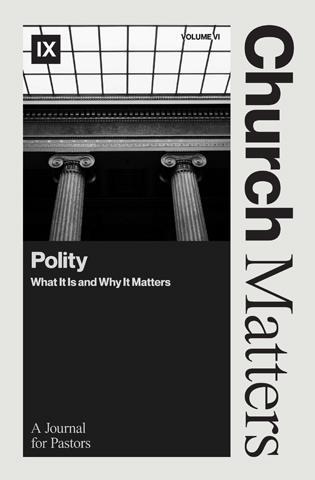Church Staff Belong in Two Buckets: Elder-Qualified or Deacon-Qualified
October 14, 2025

October 14, 2025
Not every Christian over the last 2000 years agrees that the New Testament establishes only two offices in the church. Yet many have. I do. The idea of two offices fits with Paul’s greeting to the church in Philippi: “To all the saints in Christ Jesus who are in Philippi, including the overseers and deacons” (1:1).
So what should we make of all the different positions so many churches have? There are business administrators, receptionists, directors of children’s ministry, youth pastors, ministers of music, pastoral interns, communications directors, building managers, pastoral assistants, or pastors of this, that, and the other. None of those titles are in the Bible. Doesn’t that mean we should give up the two-office game and go ahead and list as many offices as we need?
I don’t think so. Despite whatever titles we end up using, we should start by keeping the idea of two offices clearly separated in our minds for two reasons. First, God is wiser than man, and so we want to build our churches in accordance with the Scriptures.
Second, we should aspire to keep our church offices or jobs tied to biblical qualifications. Think about where Paul spends all his ink: a tiny bit on titles, a whole lot on qualifications. What does that tell us? We never want to go outside the qualifications he lists for those two offices. They’re essential to a rightly “ordered” church (Titus 1:5).
As such, we should want basically everyone working on church staff to be drawn out of one of two buckets: elder-qualified or deacon-qualified. Notice I’m not saying we must call every member of staff an elder or a deacon. But I am saying . . .
Anyone to whom a church gives the title of pastor or elder should be above reproach, the husband of one wife, sober-minded, self-controlled, respectable, hospitable, able to teach, not a drunkard, not violent but gentle, not quarrelsome but gentle, and so forth.
And anyone with any other title should be deacon qualified: dignified, not double-tongued, not addicted to much wine, not greedy for dishonest gain, holds the mystery of the faith with a clear conscience, not slanderers, sober-minded, faithful in all things, and so forth.
My guess is, you don’t want your church administrator to be undignified, your receptionist to be double-tongued, your music minister to be addicted to much wine, your children’s ministry director to be greedy for dishonest gain, and so on. In other words, I have a hard time looking at the list of deacon qualifications and thinking that anyone on church staff could lack any of those qualities.
When we build church staffing structures that lose sight of these two basic offices, we risk untethering ourselves from their respective qualifications. And that doesn’t protect the integrity or witness of the church.
When it comes to job titles for church staff, therefore, let me offer two simple rules:
Locking down the three nouns of elder, pastor, or overseer to this first office will help our churches conform to the pattern of Scripture. It’s also clear to both the staff and the church at large. Maybe this guy’s day-to-day work is preparing sermons, that guy’s is sitting in a counselor’s chair, that other guy’s is leading mission trips, while those guys work all week in secular vocations but devote their evenings and weekends to shepherding sheep. Still, everyone in the church knows, “These are our spiritual overseers and shepherds. These are our pastors and elders. And they’re all bound by the same qualifications.”
When that’s our reality, we can open our Bibles and read, “Remember your leaders, those who spoke to you the word of God. Consider the outcome of their way of life, and imitate their faith” (Heb. 13:7)—and we immediately know how to apply it. We can read a few verses later, “Obey your leaders and submit to them, for they are keeping watch over your souls, as those who will have to give an account” (v. 17)—and we immediately know how to obey it. We’re to follow the example of, we’re to submit to, these men—our pastors or elders or overseers.
Once that first office and the biblical nouns “pastor,” “elder,” and “overseer” are locked down, there’s some flexibility with that second office and the job titles we might use for them. We might formally call such people deacons in order to recognize and affirm their model service. Yet we also might hire them as the church receptionist, children’s ministry director, song leader, pastoral assistant, administrator, or building manager.
To be sure, some jobs in a church might feel like they fall somewhere in between these descriptions. Maybe you have a “Christian Education Director” who makes decisions about what’s taught in Sunday School and even teaches many classes. My advice would be to push this individual more fully toward job description 1 or 2. Either recognize that he’s already doing the work of a pastor by attending to what the church is taught, and so help the congregation recognize him as a pastor or elder as soon as possible. Or, if you’re not convinced he’s ready to be a pastor, make sure some pastor is overseeing his work. Your unwillingness to recommend him as a pastor means, to some extent, he’s still working in a diaconal capacity to assist the elders. And even if you trust his work entirely, the congregation has not yet entrusted their discipleship to his oversight.
The biblical patterns for church structures and leadership are meant to be a blessing. We shouldn’t want to look for loopholes. We should aspire to conform ourselves to the Bible and be clear about it.

Polity is not the gospel, but it’s an outgrowth of the gospel, given by God to protect and promote the gospel, particularly over time.
Go to Journal →